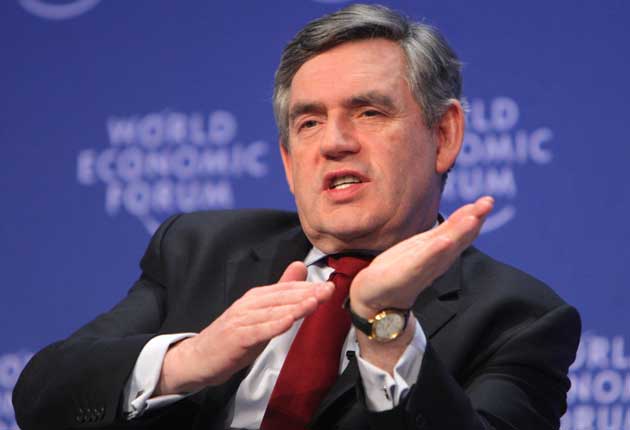Intervening to prop up pound is 'recipe for failure', says Brown
PM expected to admit today that he should have been tougher with 'freewheeling bankers'

Your support helps us to tell the story
From reproductive rights to climate change to Big Tech, The Independent is on the ground when the story is developing. Whether it's investigating the financials of Elon Musk's pro-Trump PAC or producing our latest documentary, 'The A Word', which shines a light on the American women fighting for reproductive rights, we know how important it is to parse out the facts from the messaging.
At such a critical moment in US history, we need reporters on the ground. Your donation allows us to keep sending journalists to speak to both sides of the story.
The Independent is trusted by Americans across the entire political spectrum. And unlike many other quality news outlets, we choose not to lock Americans out of our reporting and analysis with paywalls. We believe quality journalism should be available to everyone, paid for by those who can afford it.
Your support makes all the difference.Gordon Brown has indicated that he will not intervene to prevent the pound sinking still further against the dollar, the euro and other major currencies.
Speaking at the World Economic Forum in Davos, Switzerland, the Prime Minister suggested that the fate of sterling was a matter for the markets alone: "We do not target our exchange rate." That, he added, would be a "recipe for failure", as it had been when governments tried to "shadow the Deutschmark" and joined the European Exchange Rate Mechanism in the late 1980s and early 1990s.
Mr Brown's comments seem certain to push sterling lower, and may see it hit parity with the euro.
At the same time, Caroline Flint, the Europe minister, appeared to rule out British entry into the single currency, even in the long term. She told The Independent on Sunday: "We are prepared to look at the issues around the euro. This doesn't mean, in principle, that we think we have a journey to the euro. It's about whether it would work for the British economy." Her remarks appeared to be at odds with the position of the Business Secretary, Lord Mandelson, who he said this month that joining the euro remained a long-term policy objective.
Mr Brown will today take some responsibility for failing to get tough with freewheeling banks when he was Chancellor – but he will stop short of a full apology for his role in the recession. "We're toughening up the regulatory system," he will tell BBC1's Politics Show, a move No 10 hopes will tackle claims that he refuses to accept any blame for Britain's plight. "That is an acceptance that it wasn't strong enough to meet what was, effectively... a global financial freezing up."
Market fears centre on the scale of the Government's debts now being piled up, and the possibility that the Treasury will have to take on trillions of pounds-worth of liabilities if the banking system continues to falter. Many liabilities are in foreign currency and large in relation to the UK's GDP, prompting comparison with Iceland, which in effect went bust because of its overextended banks. Economist Willem Buiter has joked about London becoming "Reykjavik-on-Thames".
There are also worries about the state of the economy, and the accumulating bad debts that will accumulate as the UK enters its worst recession in 60 years. The IMF last week forecast that the British economy would shrink by 2.8 per cent in 2009, its worst showing since the Second World War, although Bank of England and Treasury officials seem relaxed about the decline of the pound, in the hope this will boost exports, although there is little evidence of that so far.
Showing considerable irritation about remarks from international investors such as Jim Rogers, who have sold sterling and declared the UK "finished", the Prime Minister said: "We are not going to build our policies around self-interested speculators."
Mr Rogers said recently that he has sold all his sterling assets. And on Tuesday, the billionaire investor George Soros, who "broke the Bank of England" during the 1992 ERM crisis, said he too had been selling, sterling over the past 12 months: "Sterling did fall from around $2 to about $1.40 and at that level the risk-reward balance is no longer compelling. I'm not saying it won't fall any more though – it will continue to fluctuate." Against a basket of currencies, the pound has lost about a third of its value in a year.
There are also concerns in some European circles that the British Government is using the hefty depreciation in the pound against the euro as a sort of stealth protectionism. Mr Brown and the German Chancellor Angela Merkel have warned in Davos about the "retreat to protectionism".
Join our commenting forum
Join thought-provoking conversations, follow other Independent readers and see their replies
Comments